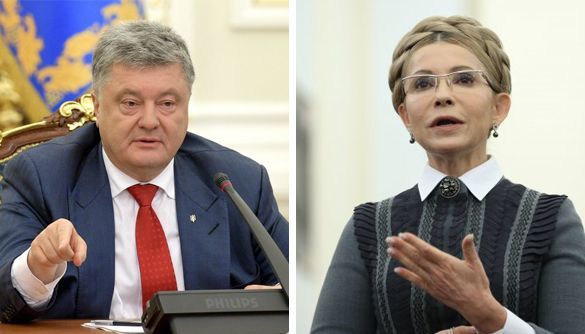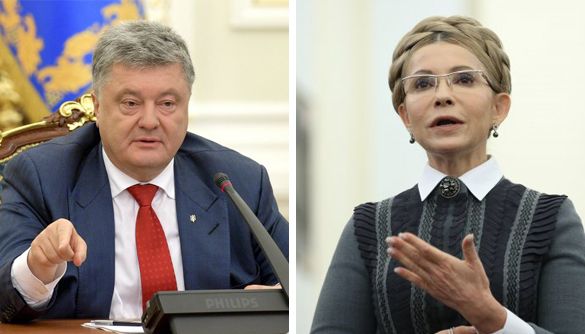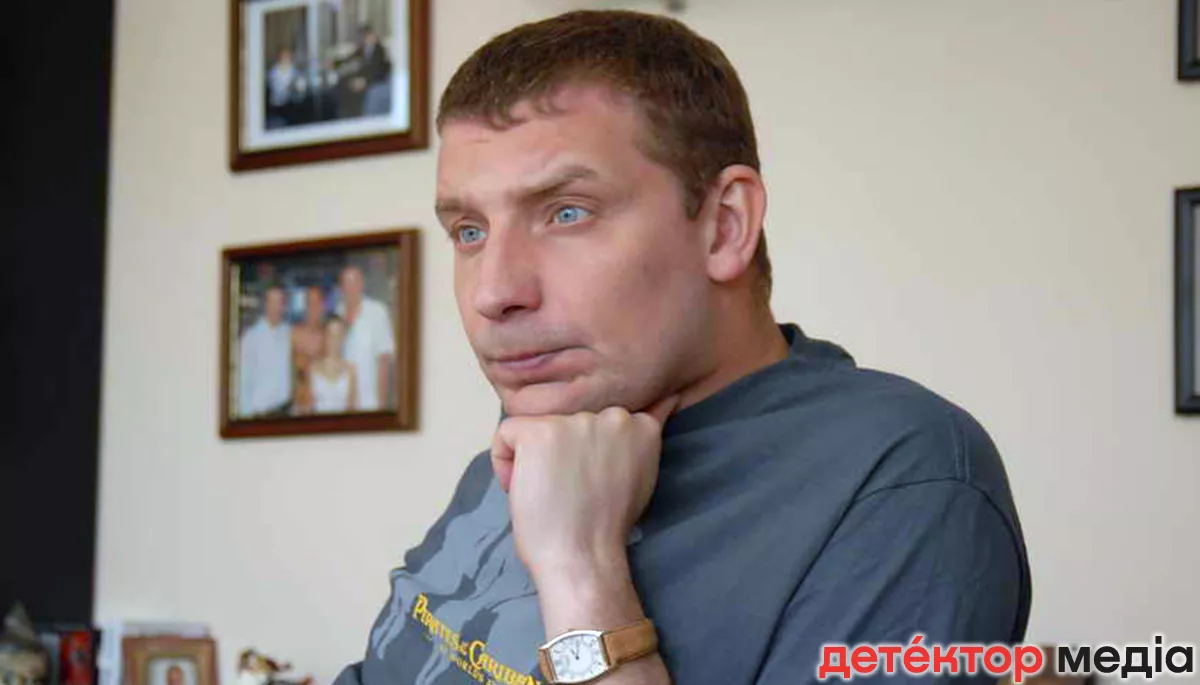
Tymoshenko provokes anxiety, Poroshenko injects tranquility
Tymoshenko provokes anxiety, Poroshenko injects tranquility


During July-August, monitoring of the government communication policy toward Donbas has detected such trends:
- President promised to bring international aid to improve life conditions in Donbas. Government started “thinking” about “integral strategy of Donbas reconstruction”.
- Minister of internal affairs was trying to begin dialogue with the citizens, living in Donbas, about acceptable conditions of the peaceful conflict resolution.
- Opposition Bloc launched propaganda campaign targeting internally displaced people
President pledged to defend and revive Donbas
In July-August president Petro Poroshenko mentioned Donbas in the context of strengthening Ukrainian Armed Forces (13 news), calling for peacekeeping UN forces (10 news) and emphasizing on the permanent Russian military threat and damages resulting from the Russian occupation (6 news).
It is important to admit that due to president’s efforts the issue of Donbas was included in the Ukraine-EU summit agenda. Comparative analysis of the Joint Statement of the 20th Ukraine-EU summit (July 9, 2018) and statements of the 17the Ukraine-EU summit and 18the Ukraine-EU summit (after 19the summit negotiating parties did not concluded any joint statement) shows that Ukraine has made progress in engaging EU into more specific and targeted actions in support of the peaceful resolution of the conflict and measures against Russia.
There were two the most important joint messages about Donbas:
- «We agreed about urgent need to provide our joint support to the most vulnerable groups of people, who live in the eastern Ukraine, including internally displaced persons»;
- «We welcomed ongoing initiatives of the EU members to provide targeted support to the communities, affected by the conflict».
However, it took month to deliver this important information about EU commitments to engage in Donbas reconstruction and support of the vulnerable groups. Only on August 26, 2018 while visiting town of Avdiivka, Petro Poroshenko told local inhabitants how EU was going to help them: «On several occasions we discussed with the leaders of the European Union the program of establishing a kind of patronage of the EU members over the certain Donbas communities. For instance, Germany can take responsibility for development of Kramatorsk, Greece – for Mariupol, Great Britain – for Volnovakha. Other countries can take responsibility for Severodonetsk, Lysychansk and Avdiivka».
During the same visit president again mentioned citizens, who live in the occupied territories. His new message was about comparing living conditions in the occupied and liberated areas of Donbas: «Just look at the life across the line of contact: total unemployment, average miner’s salary only 5,000 hryvnias, mines are closed, security is at the zero level…The quality of live is witnessing about responsibility of whose who chose the wrong way and let themselves to be obscured by cheap lies of the Russian invaders».
President tried to endorse his argument by using “good symbols” of government’s welfare policy toward “common Ukrainians” like construction of highways, increased production of the Avdiiv Coking Factory, returning of young professionals to work in Donbas after graduation from the universities.
Observing president’s communication on Donbas issues, we can assume that the policy toward Donbas remains important for Poroshenko, since it illustrates his achievements. For example, in his speech in Dnipro, dedicated to celebration of the National Flag Day, Poroshenko paid great attention to the successes and failures of the war in Donbas.
In this speech president described ongoing conflict as “another full-scale Russian-Ukrainian war” and called to dismiss any notions of “separatists’ uprising”. Poroshenko insisted that the failure to understand true nature of the conflict resulted in policy miscalculations in 2014. He argued that it also made it impossible to fulfil his promise “accomplish anti-terrorist operation in hours”.
We see it as president’s attempt to persuade Ukrainian public that the people in Donbas should not be blamed for what had happened in 2014.
On the other hand, it is important to remember that president’s views are not shared by all major political players. For instance, it is hard to see how Narodnyi Front initiative to adopt legislation in order to prosecute “collaborators” can complement president’s policy.
Although president pays a lot of attention to improvement of living conditions of people in Donbas, there are evident problems with delivering such promises.
Therefore, president has good reason to concentrate his communication on the struggle with Russia. Few presidential messages can be supported by the facts and the most important, as president stressed in ICTV talk show “Svoboda Slova”, is that liberation of Donbas cannot be achieved by unilateral concessions to Russia. However, it is still unclear whether the government does everything to explain this important policy stance to the people in Donbas.
Prime minister Hroisman: hiding behind numbers
In summer prime minister Volodymyr Hroisman rarely mentioned Donbas. Three times he referred to the region’s economic issues and two times spoke about security risks. Every time his communication was subtle and superficial.
In the end of July prime minister suddenly stated that the government had to develop “Integral comprehensive plan of reconstruction of Donbas”. Hroisman ordered ministers to “review all ongoing projects on the matter or their relevance to the interests of the people”. It appeared that there were no approved criteria of quality of implementation of governmental policy in Donbas! However, such revelation at the highest level did not provoke media hype and was not used by opponents to attack prime minister. It proves that Hroisman’s communication about Donbas issues is so rare that nobody cares what he is saying about it.
Then, on July 31, 2018, Hroisman posted statement about projected public expenditures in Donbas. He repeated the same number, 12.2 bln UAH, which he announced for the first time in June, without explanation why Donetsk region would get 9.9 bln while Luhansk region – only 2.3 bln. Hroisman reiterated that every project would be checked by the government without any clarification how and when it would be done. As a result government communication about Donbas issues seems to serve only one purpose - avoiding any substantive talk and cutting off feedback from society.
Ministry for temporary occupied territories and internally displaced people affairs (MinTOT): abundant PR and hollow promises
Although MinTOT was established to implement specific governmental policies toward Donbas, its communication lacks focal point. For instance, in July-August MinTOT released four general political statements and spoke four times about activity of the other governmental agencies.
There were only two occasions when MinTOT informed about its own actions. On July 18, MinTOT published information about internal meeting about water supply problems in Donbas. However, it was said that MinTOT decided “to develop common decision based on the project proposed by “Donetsk Institute of Water” Ltd in cooperation with Mariupol city council and Donetsk oblast civil military administration. Thus citizens in Donbas had no chance to understand when and how this problem will be fixed.
In August MinTOT informed that minister Vadym Chernysh visited Mariupol to participate in inauguration of the several reconstructed objects like restored technical high school, living quarter for IDPs and secondary school. We have to remind that in June minister did the same business trip to Mariupol and took part in the same kind of events.
Thus we do have to question: are the news, which includes only celebration and appraisal of the public activity of the minister, the best way to communicate with the ministry’s target audience?
The monitoring and analysis of the MinTOT communications shows that such superficial communication, which creates picture of alternative nice reality, serves only to the interests of the top officials not the common people of Donbas.
Ministry of Information Policy: is reintegration of Donbas postponed forever?
The top August news of the Ministry of Information Policy was that the government adopted the Strategy of Information Reintegration of Donetsk and Luhansk Oblasts. However, according to first deputy minister Ms. Dzaparova, implementation of the strategy demands a lot of money.
Thus it seems like MIP is stripping itself of responsibility for what will happen next, since it is out of their power to redistribute governmental expenditures. However, there is an open question about ministry’s responsibility for proposing realistic and measurable ways and means of strategy’s implementation, based on understating of the current political situation.
Thus in the next monitorings we will follow whether MIP is doing its job.
Minister of Interior Arsen Avakov amends his “Donbas reintegration plan”
The most important message of minister Avakov was about “uneasy red lines” or boundaries of the possible compromises about the future peace in Donbas.
For the first time Avakov decided to start debate about issues of real concern for the people who live in Donbas (the importance of these issues is demonstrated, for instance, by sociological surveys):
- The details and conditions of the “special status” of Donbas;
- The proposal of granting the status of official regional language to the Russian language;
- The obligation of the government to make all compulsory social payments to the people, living in the occupied territories.
Although issues of the Russian language and “special status” are not seen acceptable by the majority of Ukrainians, they do have substantial support among citizens in the eastern and southern regions of Ukraine. Therefore, we think that Avakov sent message to these target group that some parts of the government can be flexible toward their wishes and demands.
At the same time Avakov did not mentioned his earlier message about necessity to adopt the “law about collaborators”, which can be cautiously called a progress. As we have written in previous text, this proposal would definitely damage public trust toward authorities. If Avakov drops this idea completely it will that minister of interior is really serious about establishing feedback with the people who live in the liberated and occupied territories of Donbas.
Donetsk Civil Military Administration: New Governor Kuts stayed in track of his predecessor
It seems that new head of the Donetsk State Administration Oleksandr Kuts decided to avoid any kind of changes in relations with Donbas media and people. In July-August Mr. Kuts used the same kinds of topics and messages that were trademarks of former head Pavlo Zhebrivskiy. Kuts made seven statements about progress in reconstruction and repair of houses, schools and highways. On two occasions Kuts reported about accomplished promises (restoration of water supply facilities in Kostiantynivka and gas distribution network in Avdiivka). He also informed about granting new permanents residencies and apartments to IDP families and orphans, announced about state support to entrepreneurs (meetings with «kurkuls», miners and small enterprises). Kuts reported about meetings with foreign delegations discussing security (with OSCE observers) and reconstruction of Donbas (USAID delegation, and UN mission).
Luhansk Civil Military Administration: intensive but non-transparent communication
In July-August head of Luhansk Civil Military Administration Yuriy Harbuz significantly increased his public activity. His communication was focused on solutions of the social security and economic development issues (8 news) and reconstruction of infrastructure (6 news).
However, all these efforts to improve public relations were formal. For example, on July 9 Harbuz announced that the small and medium enterprises of Luhansk oblast would be supported by additional 0.5 mln UAH. At the same time he did not specified how these money would be redistributed and what are “priority branches of local economy”.
We have to admit that Harbuz tried to show that he was very active in lobbying interests of the region. For instance, he used his meeting with commanders of the Joint Forces Operation to tell about troubles with electricity distribution in the region. When acting healthcare minister Suprun visit Luhansk region, governor informed her about deficit of state financing of the local hospitals and clinics. At the same time Harbuz was keen in flattering high guest from Kyiv: when president’s representative Iryna Herashchenko visited reconstruction sites in Luhansk region, governor told that revival of regional infrastructure was possible only due to support of MPs like her.
Solidarnist: Donbas out of priority list
In July-August pro-presidential party Solidarnist concentrated its public communications on the issues of releasing political prisoners and hostages (19 news), legislative support of military and security operations in Donbas (12 news) and Russian aggression in Donbas (7 news).
There were few messages to the citizens living in Donbas: First vice chairwoman of parliament Iryna Herashchenko spoke about urgency of approving law on humanitarian demining of Donbas, while Maria Ionova informed about sending group of children from Donbas to spent several weeks in Croatia.
At the same time there were more news when Solidarnist MPs used Donbas issues to position themselves as “true advocates” of people’s interests and values or loyal members of president’s team:
- Vinnyk speculated that Ilovaisk defeat was heroic not tragic event;
- Yefimov and Lubinets praised Poroshenko for the efforts to maintain international support of reconstruction of Donbas;
- Iryna Herashchenko disseminated party propagandistic messages and condemned Poroshenko’s rivals for not being interested in Donbas.
Batkivshchyna played with fire
Leader of Batkivshchyna party Yulia Tymoshenko made the most controversial statement about future of Donbas. In July she accused president Poroshenko in negotiations with separatists aimed at starting the war and keeping himself in power. Tymoshenko warned people that Poroshenko was thinking to begin full scale war with Russia.
It is not new for the Ukrainian politics to blame opponents in all misfortunes of the people. However, people in Donbas live in constant anxiety about the war which is fueled by Russian propaganda. It is possible that while making such sensational statement Tymoshenko tried to increase her chances to bring down incumbent but in reality it sounded very alarming to the people in Donbas. Moreover, unconfirmed information could backfire Tymoshenko and undermine trust toward her future statements.
Thus members of Batkivshchyna had to shift attention from leader’s statements. Tymoshenko herself put blame on Russia for aggression in Donbas, Ivan Krulko reminded about Putin’s responsibility for shooting down MH-17 airliner. Then, Tymoshenko merged two messages about president’s and Russia’s guilt in one statement about Ilovaisk tragedy adding that higher official would go on trial for military defeats, inferring Poroshenko’s responsibility for high casualties.
Opposition Bloc continued attacks against government
Donbas issues remained top priority in public communication of the Opposition Bloc leaders:
- They demonstrated their care about people who suffered from the war (9 news);
- Insisted on implementation of the Minsk agreements and restoration of ties with Russia (8 news);
- Condemned governmental policies toward Donbas (6 news);
- Promoted achievements in protection of social rights Donbas inhabitants (4 news);
- Accused government and president in deliberate war policy in Donbas (2 news).
Overall, Opposition Bloc used Donbas issues to hyperbolize failures of the government and promote their own ideas how to fix them. The main goal of their communication was not to explain what they would do to improve situation in Donbas but what troubles wait for people if current government is not removed from power. It is well illustrated by statements of the former Lysychansk mayor Serhiy Dunayev who blamed government for decreasing business activity in Luhansk region.
The only exception was message of Yuriy Boyko about importance of the so-called temporary “school armistice” . This was the first time when leader of Opposition Bloc recognized that security conditions of the Minsk agreements had to come before political steps of Ukrainian government.
In the next monitoring we will look whether Boyko just wanted to play with sentiments of the parents who sent children to schools or he was serious about sequence of the Minsk agreements.
Radical Party of Oleh Liashko: masculine flirting with Donbas
In July-August Oleh Liashko actively pursued the same goals and competed with Opposition Bloc for attention of the Donbas inhabitants. His strongest point is skillful communication based on the use of plain but tough, street language. Liashko felt quite comfortable while communicating his ideas to IDPs, military servicemen and women, doctors, teachers and Mariupol community.
Liashko did not shy when he repeated messages of both government and opposition. Therefore his communication could be assessed as chaotic and disorganized by external observer but his messages were well suited to the people who live in Donbas and wait for decisive actions of the state.











